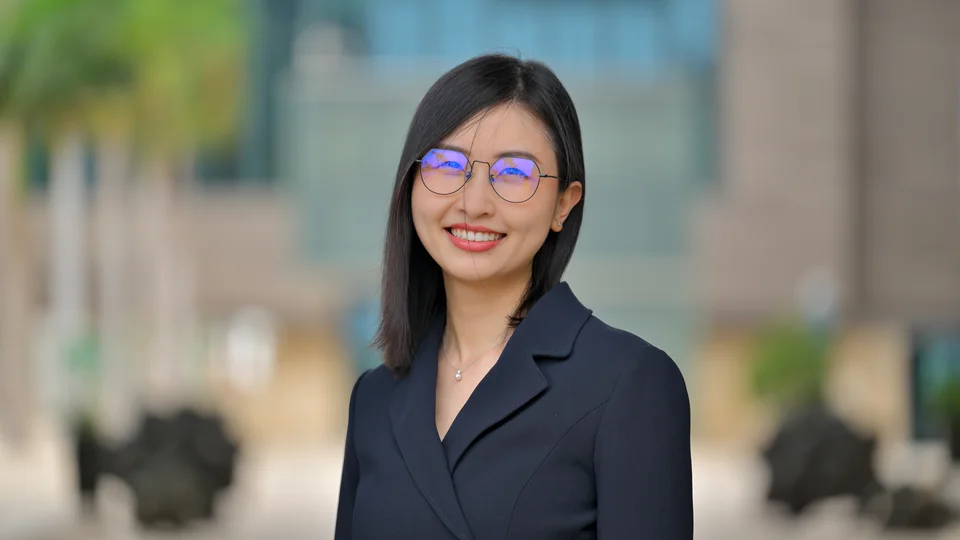
Double honors for Professor Yating Wan
KAUST Professor Yating Wan receives the 2025 Sony Women in Technology and IEEE Young Investigator Awards.
About
KAUST Assistant Professor of Electrical and Computer Engineering Yating Wan has recently been awarded the Sony Women in Technology Award with Nature and the 2025 IEEE Photonics Society Young Investigator Award.
Launched in March 2024 by the Sony Group Corporation (Sony) in partnership with Nature, the Sony Women in Technology Award recognizes outstanding early- to mid-career researchers in STEM (science, technology, engineering, and mathematics).
Three winners were selected for the Sony award based on the criteria of "ambition, innovation, conceptual excellence, impact and social significance." Wan won this year’s early career prize for her work in silicon photonics. The judging panel commended her as a rising star, highlighting her “significant contributions to the future of data communications and potential to revolutionize silicon photonics.”
Sony and Nature announced the award winners at a ceremony held in Tokyo, Japan, on February 5, 2025. Each recipient was awarded $250,000 USD to support research focused on technological breakthroughs that benefit society.
Wan will use the Sony research grant to advance the development of high-efficiency integrated optical sources critical for artificial intelligence acceleration, optical communications, and quantum technologies.
The 2025 Young Investigator Award was established to honor an individual who has made outstanding technical contributions to photonics before their 35th birthday. The IEEE PS recognized the KAUST researcher for her “contributions to silicon photonics and the integration of on-chip light sources.”
Wan will officially receive the award at IEEE Photonics Conference 2025, which will be held from November 9 to 13, 2025, in Singapore.
Creating life-changing research
Wan, the principal investigator of the KAUST Integrated Photonics Lab (IPL), specializes in integrated silicon photonics (SiPh), a material platform from which photonic integrated circuits (PICs) can be made. Her research focuses on integrating quantum dot lasers with silicon photonics—an essential step toward making photonic chips commercially viable.
In recent years, academia and industry have significantly increased their investments in SiPh, which has emerged as one of the most energy-efficient, scalable and eco-friendly solutions to transmit data optically.
Collaborating with industry partners, Wan’s IPL team explores practical applications such as optical datacom, sensing and artificial intelligence technologies. The IPL team is developing progressive silicon chips for groundbreaking applications, such as optical neural networks and a state-of-the-art light detection and ranging (LiDAR) sensor for autonomous mining trucks.
These advanced LiDAR sensors are engineered to thrive in Saudi Arabia’s challenging landscape, where dust and extreme conditions can jeopardize conventional navigational systems. Industry collaborations have been instrumental in bridging the gap between this academic research and the impact of its real-world-ready technology.
“Our research aligns with Saudi Arabia’s Vision 2030 and KAUST’s new strategy to promote sustainable and scalable technologies. We aim to contribute to the Kingdom’s environmental and economic goals by developing energy-efficient and scalable photonic technologies,” Wan emphasized. “Our goal is to establish Saudi Arabia as a hub for cutting-edge photonics research, benefiting both academia and industry.”
Guiding and supporting the next generation of female scientists and engineers
To date, Wan has published more than 100 peer-reviewed papers. She has also served as an associate editor for numerous journals and referees for more than 100 manuscripts for IEEE, OSA, and Nature Publishing Group journals.
Her innovative contributions to on-chip laser integration have earned her numerous honors, such as the 2017 HKUST PhD Research Excellence Award, the 2018 PIERS Young Scientist Award, the 2021 OGC Best Young Scientist Award, the 2021 CLEO Tingye Li Innovation Prize, the 2022 Rising Stars of Light by Light: Science & Applications. MIT Technology Review also selected her in their "35 Innovators Under 35 for China" list for 2023, and she served as an Optica Ambassador in 2024.
Her two most recent awards—the 2025 Sony Women in Technology Award and the 2025 IEEE Photonics Society Young Investigator Award—further underscore her leadership in silicon photonics and the collaborative spirit at KAUST that drives her innovation. Wan credits her University mentors, research team and collaborators for their unwavering support and inspiration.
“I am grateful to KAUST for providing an exceptional research environment that fosters innovation, collaboration and interdisciplinary breakthroughs,” she noted. “I am deeply grateful to my mentors, colleagues, collaborators and students for their unwavering support and dedication.”
Through her recent awards, Wan hopes to motivate and inspire more young scientists to pursue careers in photonics.
“These awards motivate me to keep pushing the boundaries of what we can achieve in silicon photonics. I am committed to mentoring the next generation of scientists and engineers. Together, we can continue breaking barriers and creating technologies that change the world.”
